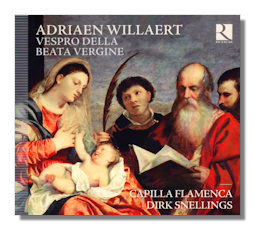
The Internet's Premier Classical Music Source
Related Links
- Willaert Reviews
- Latest Reviews
- More Reviews
-
By Composer
-
Collections
DVD & Blu-ray
Books
Concert Reviews
Articles/Interviews
Software
Audio
Search Amazon
Recommended Links
Site News
 CD Review
CD Review
Adriaen Willaert

Vespro della Beata Vergine
- Annibale Padovano:
- Toccata del ottavo tono
- Toccata del terzo e quarto tono
- Adriaen Willaert:
- Ave maris stella
- Dixit Dominus (Psalm 109) for 8 Voices
- Lauda Jerusalem
- Laudate pueri Dominum (Psalm 112) for 8 Voices
- Nisi Dominus (Psalm 126) for 4 or 5 Voices
- Ricercar primo à 3
- Ricercar primo à 4
- Ricercar settimo à 3
- Ricercar 10 à 4
- I sacri e santi salmi che si cantano à Vespro e Compieta:
- Laetatus sum
- Magnificat for 4 Voices
- Benedicamus in laude Jesu
- Motet "Benedicta es, coelorum regina" for 7 Voices (Musica Nova)
Joris Verdin, organ
Capilla Flamenca/Dirk Snellings
Ricercar RIC325 79:30
Belgian director/conductor and bass Dirk Snellings has established quite a reputation for his small group, Capilla Flamenca. Holding a Masters degree in musicology, he graduated with a first prize (voice) from the Antwerp Conservatory. Snellings' perspective on Renaissance polyphony is enriched by a dedication to new music. It's hardly fanciful to hear the focus, clarity and insights that result from this in the performances by the eight-person Capilla Flamenca with Joris Verdin, organ, on this award-winning CD on Ricercar of Adriaen Willaert's (c.1490-1562) Vespers.
The first few minutes of the performances on the CD are more than likely to impress you. Willaert isn't always given credit for his achievements. His stature is major. A Flemish composer who moved to Italy, drawing on Northern European traditions, he virtually established the Venetian school which endured for many generations. Previously, Willaert had studied or worked in Paris, Rome and Ferrara; the latter appointment at the d'Este court took him to Hungary. His music remains transparent, lucid, rich, without being over-textured or unduly inflected melodically, harmonically or structurally.
And it's this mix of coherence, momentum, direction on the one hand, and openness, clarity and fresh translucence on the other that the performers have captured so well on this CD. The text should be at the center of any such conception. It is here. Avoidance of too florid an articulation is crucial. Here it is avoided. The resultant sense of understanding by the singers in what Willaert was conveying is necessary in order that the whole functions over and above the long-established setting for the service for Vespers of the Psalms, Magnificat and so on.
Snellings and Capilla Flamenca have that understanding, involvement, investment; they have them in abundance. Some of the more spectacular recordings of the most famous of Willaert's successors at St. Mark's in Venice, Monteverdi, emphasize spectacle, projection, pomp; at the expense of substance. This recording, a recreation of the Marian Vespers as contained in the earlier composer's "Sacri e santi Salmi" of 1555, is at the other end of the spectrum. Nevertheless, it's neither spare nor lacking in impact. Rather, our reaction to it is informed by a confident and gentle approach where the intricacies of the polyphony and counterpoint are allowed to follow their own ends. The development of the melodic lines is given full rein. Listen to the pace of the exultant "Lauda Jerusalem" [tr.11], for instance. It's full of celebration. But the articulation of the singers suggests immediately why there is something to celebrate.
In writing the works that make up his "Vespro", Willaert had also to blend the long established Gregorian melodies with an idiom where polyphonic variety was almost a virtue in its own right. At the same time, the inclusion of five psalms, antiphons, "Deus in auditorium" and so on could have disjointed the flow – particularly as this realization does intersperse half a dozen organ ricercars and toccate.
Not in this case. The performers have achieved – almost effortlessly, it seems – an awareness of the architecture of the overall sensations which Willaert intended, of how the music "inhabits" the liturgical motives; and carries the sense of service forward. This could be particularly challenging since the numbers have deliberately been sequenced alternatim (chant and polyphony in turn) and as dialogs between parts and groups. In fact, the result is closer to spezzatura, where the skill and conviction of the performers conceal any and all potential discontinuity.
The Belgian church, the Kapel Zusters van Sint Vincentius in Gijzegem, is the location for all but Verdin's organ numbers (which were played and recorded on two nearly contemporary instruments of the Basilica San Petronio in Bologna) is slightly resonant; helpful but not intrusive. It favors the sense that the music is unhurried yet purposeful. Quietly respectful of its liturgical goal, but not ostentatious in its tempi, for example. There was much scope for selection of what to include. And it's a convincing and effective selection by Snellings. It builds a persuasive and winning "Vespro". The CD's booklet has a short essay on the music, particularly the context of the Vespers in which Willaert was writing, and the Latin text without translation. Willaert's is beautiful, important and approachable music. It should be better known. With advocates like those on this excellent CD, he could hardly ask for a more enjoyable and effective way for that to happen. Thoroughly recommended.
Copyright © 2013, Mark Sealey





















